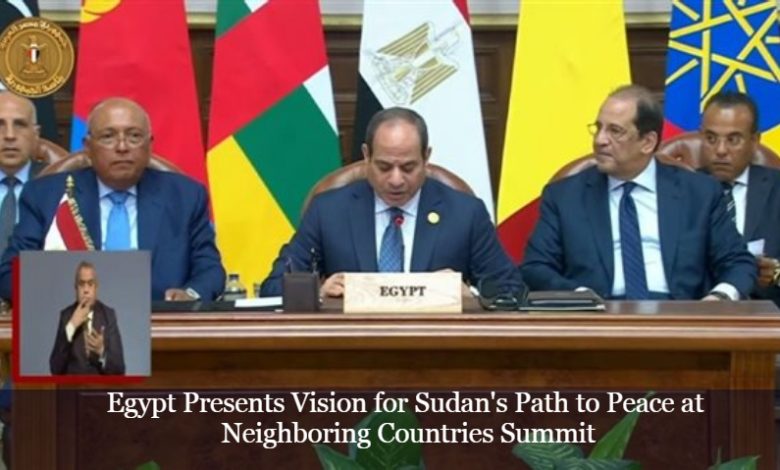Neighboring countries of Sudan meet in Egypt to work on resolving the crisis
The Sudanese government says it views the Egyptian mediation initiative positively and warns of the difficulty of achieving its goals

Egypt is hosting, Thursday, the ‘Summit of Sudan’s Neighboring Countries’ to discuss ways to end the ongoing conflict that has been going on for 12 weeks between warring military factions, causing a major humanitarian crisis in the region.
The Egyptian presidency announced in this context that President Abdel Fattah el-Sisi received Ethiopian Prime Minister Abiy Ahmed at the Presidential Palace in Cairo on Wednesday, and ‘they discussed ways to resolve the crisis in Sudan and enhance bilateral relations between Egypt and Ethiopia, as well as the issue of the Renaissance Dam.’
Diplomatic efforts to stop the fighting between the two sides have proven to be ineffective so far, as initiatives from competing powers have caused confusion about how to persuade the conflicting parties to negotiate.
The two largest neighbors of Sudan, Egypt and Ethiopia, have been at odds in recent years over the construction of the massive Renaissance Dam for hydroelectric power generation on the Blue Nile in Ethiopia, near the Sudanese border.
The Egyptian Ministry of Foreign Affairs spokesperson, Ahmed Abu Zeid, announced on Wednesday evening the start of the preparatory session for the Summit of Sudan’s Neighboring Countries at the level of senior officials, which is scheduled to begin its work in Cairo today, Thursday.
The summit comes in an attempt to end the conflict between the army and the Rapid Support Forces to stop the bloodshed of the Sudanese people, as well as to discuss ways to resolve the conflict and its negative repercussions on the neighboring countries of Sudan.
The Sudanese delegation is led by Vice Chairman of the Sovereignty Council, Malik Agar, and the delegation also includes the Acting Foreign Minister, Ambassador Ali Al-Sadiq, according to the “Al-Sudani” newspaper.
The summit, which will also be attended by Sudan’s neighboring countries at the highest level of representation, including Eritrean President Isaias Afwerki, is the latest link in the chain of unlimited support provided by Cairo to Khartoum.
According to Advisor Ahmed Fahmy, the official spokesperson for the Presidency, the conference will establish effective mechanisms involving neighboring countries to resolve the crisis in Sudan peacefully, in coordination with other regional and international tracks for conflict resolution.
The summit also comes as part of the Egyptian leadership’s keenness to formulate a joint vision for Sudan’s direct neighboring countries, and to take steps to resolve the crisis and stop the bloodshed of the Sudanese people, and to prevent the negative effects they are experiencing, while preserving the Sudanese state and its capabilities, and reducing the continued serious effects of the crisis on neighboring countries and the security and stability of the entire region.
The International Organization for Migration announced on Wednesday that more than 3 million people have been displaced due to the clashes between the Sudanese army and the Rapid Support Forces.
The international organization reported that “more than 2.4 million have been displaced internally, while more than 730,000 crossed the borders to neighboring countries.”
The report indicated that “255,000 people were registered in Egypt, 238,212 in Chad, 160,798 in South Sudan, 62,509 in Ethiopia, 16,710 in Central Africa, and about 2,992 in Libya.”
The summit comes amid the failure of other international and regional mediation efforts, most notably the joint Jeddah mediation between Saudi Arabia and the United States, which has so far failed to persuade the conflicting parties to sit together, and the mediation carried out by the Quartet Committee of the Intergovernmental Authority on Development (IGAD), which the Sudanese Ministry of Foreign Affairs rejected Kenya’s chairmanship of its meeting and said that its delegation in Addis Ababa is “waiting for a response to our request to change it.”
Sudan shares borders with 7 countries: Egypt, Libya, Chad, the Central African Republic, South Sudan, Ethiopia, and Eritrea, in addition to having a maritime border with the Kingdom of Saudi Arabia.
The concerned countries have announced their agreement to participate in the summit, and some leaders have started heading to Cairo.
The decision to hold the summit was welcomed by the conflicting parties, as the Sudanese Acting Foreign Minister, Ali Al-Sadiq, stated on Wednesday that his country looks “positively” at the Egyptian mediation initiative, but he warned of the difficulty of achieving its goals if others from outside the region participate.
On his part, the advisor to the Rapid Support Forces, Ahmed Abdeen, said that they “welcome any effort or endeavor to end the current crisis in Sudan, and the Rapid Support Forces do not have a stance towards any country, including Egypt, and we do not want Sudan to live far from its regional environment and neighboring countries, as it experienced during the days of the ousted President Omar al-Bashir.”
Abdeen accused elements of the previous regime of “working to return the country to its isolation before the revolution, and this group is causing tension and instability in relations with Egypt and other neighboring countries, as Sudan has turned into terrorist incubators that are active against its countries.












